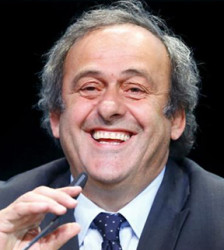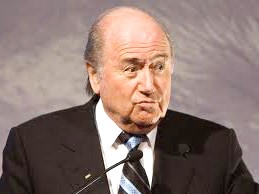BERNE, (Reuters) – UEFA president Michel Platini ended weeks of uncertainty yesterday when he announced that he would stand for the presidency of FIFA in place of outgoing Sepp Blatter.
The former French international, who has been UEFA president since 2007 and a FIFA executive committee member since 2002, said he wanted to “to give FIFA back the dignity and the position it deserves.”


Platini, who played in three World Cups for France and led them to the European championship title in 1984, said he had written to the 209 member associations of FIFA, who each hold one vote in the presidential election, to inform them of his decision. “This was a very personal, carefully considered decision, one in which I weighed up the future of football alongside my own future,” he said in the letter, according to a statement published on the UEFA website (www.uefa.org).
“I was also guided by the esteem, support and encouragement that many of you have shown me.”
“There are times in life when you have to take your destiny into your own hands.”
Blatter was re-elected for a fifth term as president on May 29, but four days later said he would lay down his mandate amid the worst crisis in FIFA’s history. Blatter will remain as president until the election on Feb. 26.Once seen as a Blatter protege, Platini has recently become a leading critic of the 79-year-old Swiss. He urged Blatter not to stand in May and said the series of recent scandals involving FIFA turned his stomach. However, he has repeatedly said he enjoys his UEFA role and would be reluctant to give it up.
“During this last half-century or so, FIFA has only had two presidents,” said the moody Frenchman, referring to Blatter, who has been in charge since 1998, and his predecessor Joao Havelange, who ruled from 1974 to 1998.
“Recent events force the supreme governing body of world football to turn over a new leaf and rethink its governance.”
Under Platini’s leadership, UEFA has implemented a controversial break-even policy known as financial fair play in an attempt to stop clubs from overspending.
He has also opposed the use of technology to help referees make decisions and UEFA has instead employed two additional linesmen on the goal-lines during Champions League matches.
As a FIFA executive committee member, he admitted that he was one of those who voted for Qatar’s successful, but controversial, bid to host the 2022 World Cup.
He was also among the leading proponents of switching the tournament to November and December rather than the traditional June/July slot.
Platini, who also coached France for four years before moving into soccer politics, said he was standing as a candidate “with enthusiasm and conviction, but also with the humility of someone who knows that he cannot succeed on his own.”
“I am counting on your support and our common love of football so that, together, we can give the tens of millions of football fans the FIFA that they want: a FIFA that is exemplary, united and shows solidarity, a FIFA that is respected, liked and of the people.” He added: “For more than 50 years, my life has revolved around football. It has never stopped being my passion and it is still what motivates and drives me.” “It has helped me to grow and mature. It gave me all I could wish for as a player and, over the years, it has helped me to become an accomplished man and a responsible leader.”
